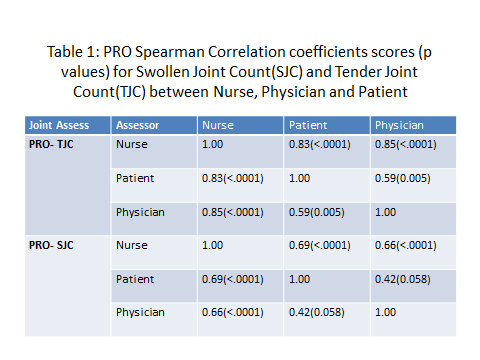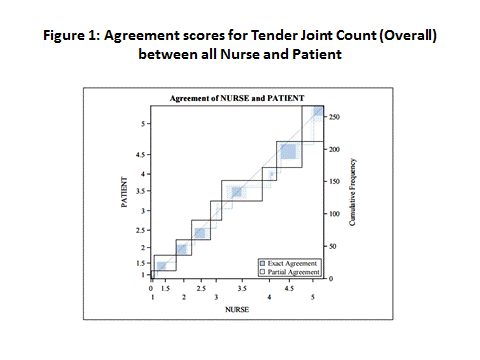Session Information
Session Type: ARHP Concurrent Abstract Session
Session Time: 4:30PM-6:00PM
Background/Purpose: Clinical disease activity for patients with rheumatoid arthritis requires frequent monitoring for optimal management. Patient reported outcome (PRO) tools provide information that complements physician’s assessment of changes in disease activity and response to treatment. The use of electronic data capturing (ePRO) is potentially advantageous over paper based (pPRO) in terms of reducing missing data, reducing ambiguous responses and allowing time-stamped records and analysis.
Methods: Patients were assigned randomly to either ePRO or pPRO at visit one. At visit 2, patients crossed over into the other PRO modality (both pre-treatment) and remained in that arm for subsequent visits at week 6, 12 and 36. Patient assessments included 28 swollen (SJC) and tender joint counts (TJC), Patient assessment of pain (PAAP), Patient assessment of global disease activity (PtGADA) and Bristol Arthritis Fatigue Multidimensional Questionnaire (BRAF-MDQ).
Results: 52 patients with mean RA duration 11.7 years were enrolled and. Mean age was 55.7 (SD 14.3) years and 67% were female.
There was moderate to high correlation (Table 1) and agreement (Figure 1) between Nurse-Patient-Physician PRO assessments. There was no significant difference in PtGADA, PAAP and BRAF-MDQ between ePRO and pPRO assessments.
Patients reported high levels of satisfaction with both PRO arms with only 2 patients (8.3%) reporting dissatisfaction. 88-92% reported that they were either satisfied or very satisfied with either tool. 58% of those who transitioned from ePRO to pPRO had no preference for one over the other format whereas 67% of those who transitioned from pPRO to ePRO preferred the electronic tablet.
Conclusion: Both ePRO and pPRO provided consistent results and demonstrated equivalence in PRO assessment. ePRO was well embraced by patients with only a minority reporting dissatisfaction. It may be a desirable inclusion in routine RA and potentially other disease assessments for its added reliability, consistency and increased patient involvement.
Acknowledgements
1. UCB Australia for financial support
2. Australian Rheumatologists for supplying patient data.
To cite this abstract in AMA style:
Inderjeeth C, Raymond W, Inderjeeth A. Comparing the Electronic Patient Reported Outcome (ePro) Tool Versus the Paper Reported Outcome (pPro) Tool in Rheumatoid Arthritis Patients Treated with Certolizumab Pegol [abstract]. Arthritis Rheumatol. 2016; 68 (suppl 10). https://acrabstracts.org/abstract/comparing-the-electronic-patient-reported-outcome-epro-tool-versus-the-paper-reported-outcome-ppro-tool-in-rheumatoid-arthritis-patients-treated-with-certolizumab-pegol/. Accessed .« Back to 2016 ACR/ARHP Annual Meeting
ACR Meeting Abstracts - https://acrabstracts.org/abstract/comparing-the-electronic-patient-reported-outcome-epro-tool-versus-the-paper-reported-outcome-ppro-tool-in-rheumatoid-arthritis-patients-treated-with-certolizumab-pegol/


